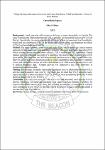| dc.description.abstract | Background: Food insecurity still remains a challenge to many households in Uganda. The
study examined the relationship between VSLA activities and household food security in Kole
District. Specifically, the study examined the effects of VSLA on household food Availability,
established the contribution of VSLA on the household food Access, and determine the effects
of VSLA on household food Stability.
Method: The study adopted a cross-sectional study deign, which employed a mixed method
approach of both quantitative and qualitative methods. The study population consisted of 252
which included district and sub-county officials, VSLA leaders, and VSLA members. Simple
random sampling technique and purposive sampling, was used to select a sample size of 148
participants. The researcher used self-administered questionnaires to collect quantitative data,
interview guide and focus discussion guide to collect quantitative data. Descriptive statistics
(mean, and standard deviation), and inferential statistics (correlation and regression) were used
to analyze numerical data. Content analysis was quantitative data from interviews to
supplement quantitative data.
Finding: The findings revealed a statistically significant positive relationship between VSLA
activities and household food security. The study also revealed that VSLA activities had a
significant effect of food availability (β=0.721, P<0.05), food accessibility (β=0.609, P<0.05)
and food stability (β=0.761, P<0.05).
Conclusion: The study concludes that VSLA activities and household food security in Kole
District. Therefore, for improved household food security in Kole District. Therefore, for
improved household food security, Kole District Local Government is encouraged to mobilize
local community to join VSLA so that they can be in position to access affordable capital to
increase their level of production.
Keywords: Village Savings, Loans Association Activities And House Hold Food Security | en_US |

